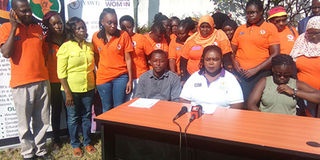Gender and sexual violence prevails in Nakuru despite activism

Ms Esther Mwai (Centre) leads Young African Women Initiative members during a presser on the worrying statistics of sexual violence in Nakuru County on January 16, 2020. PHOTO | PHYLLIS MUSASIA | NATION MEDIA GROUP
What you need to know:
- Nakuru County records a higher percentage of GBV than the national average.
- The Young African Women Initiative (YAWI), GBV prevention network in Nakuru raised concerns over the rising incidents of violence against women.
Despite the vocal 16 days of activism against gender-based violence campaigns in part of November and December last year, the statistics of violence against women and girls in Nakuru remain on the rise.
Recent reports obtained by the National Bureau of Statistics indicate that 61.8 percent of women in the county are victims of gender violence.
The figure is much higher than the national average of 45 percent.
On Thursday, the Young African Women Initiative (YAWI), a GBV prevention network in Nakuru raised concerns over the rising incidents of violence against women noting that the specific laws and policies enacted in the country have not achieved much success.
The initiative further observed that the high number of rape cases and other forms of sexual violence condemned during the activism period are still reported in Nakuru County.
“We stand with our fellow women and appeal to our constitution to extend no leniency to those who trample on the rights of women,” said the initiative’s Executive Director Fidelis Karanja in a statement.
SEXUAL VIOLENCE CASES
The network aims to provide women survivors of war, civil violence, and gender-based violence with the tools and resources necessary to move from crisis and poverty to stability and self-sufficiency.
The launch of the 16 days of activism against gender violence last year saw the Ministry of Health announce the government’s commitment to making Kenya free of violence against women.
The government, in a joint initiative with the United Nations, signed in April a four-year, $11.5 million contract for the prevention of and response to gender-based violence.
The Ministry is seeking to develop a policy on zero tolerance to gender based violence to curb violence against women.
In Kenya, several laws address violence against women, including the Matrimonial Causes Act, Sexual Offences Act, Children’s Act, Protection against Domestic Violence Act and Prohibition of Female Genital Mutilation Act; all of which are contained in the Constitution of Kenya’s Penal Code. These are complemented by such policies as the National Policy for Prevention and Response to Gender-Based Violence, instituted in 2014.





